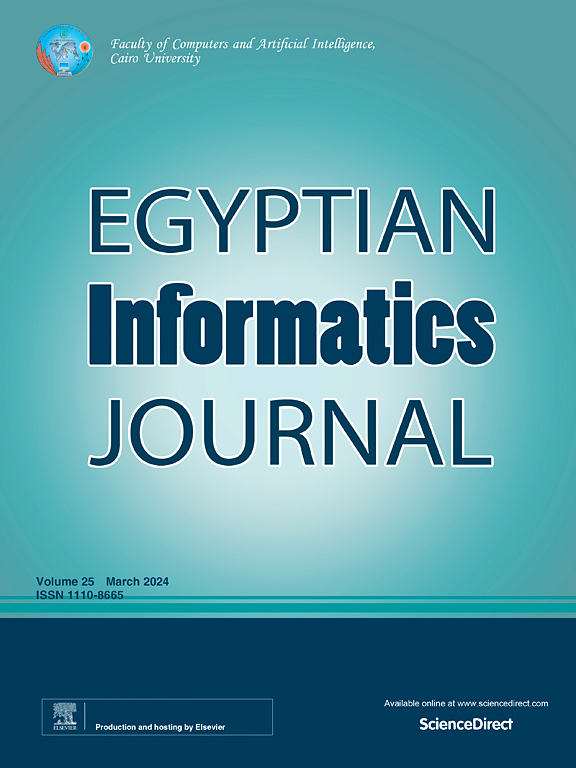Enhanced multiple sclerosis diagnosis by MRI image retrieval using convolutional autoencoders
IF 4.3
3区 计算机科学
Q1 COMPUTER SCIENCE, ARTIFICIAL INTELLIGENCE
引用次数: 0
Abstract
Multiple sclerosis (MS) is an autoimmune disorder characterized by damage to the central nervous system (CNS), leading to neuronal degeneration and affecting over 2.8 million individuals globally. Early and accurate diagnosis of MS is critical, given its significant social and economic consequences. Magnetic resonance imaging (MRI) remains the gold standard for MS diagnosis and monitoring. This study introduces a novel Content-Based Medical Image Retrieval (CBMIR) framework that leverages a newly designed Convolutional Autoencoder (CAE) model to improve the diagnostic evaluation of MS-related MRI scans. The proposed system extracts latent features from query and reference MRI images using the CAE. Extensive ablation studies involving nine distance metrics and diverse feature space dimensions identify 64 as the optimal latent feature size and validate the Mahalanobis distance as the superior similarity measure. Evaluated on four publicly available MS MRI datasets, the framework achieves Mean Average Precision (MAP) scores of 91.23%, 98.68%, 99.88%, and 99.69%, respectively, demonstrating enhanced diagnostic accuracy. The system also outperforms existing similar CBMIR frameworks for other diseases in MAP scores and generalizes effectively without requiring extensive preprocessing or segmentation. The primary contribution of this work is the development of a CAE-driven CBMIR system optimized for MS diagnosis, achieving state-of-the-art MAP performance while maintaining an average retrieval latency of 780 ms outperforming the compared systems.
利用卷积自编码器的MRI图像检索增强多发性硬化症诊断
多发性硬化症(MS)是一种以中枢神经系统(CNS)损伤为特征的自身免疫性疾病,可导致神经元变性,全球有超过280万人受到影响。鉴于其重大的社会和经济后果,MS的早期和准确诊断至关重要。磁共振成像(MRI)仍然是MS诊断和监测的金标准。本研究引入了一种新的基于内容的医学图像检索(CBMIR)框架,该框架利用新设计的卷积自编码器(CAE)模型来改进ms相关MRI扫描的诊断评估。该系统利用CAE从查询和参考MRI图像中提取潜在特征。广泛的消融研究涉及9个距离度量和不同的特征空间维度,确定64为最佳潜在特征尺寸,并验证马氏距离是优越的相似性度量。在四个公开可用的MS MRI数据集上进行评估,该框架的平均精度(MAP)得分分别为91.23%,98.68%,99.88%和99.69%,显示出更高的诊断准确性。该系统在MAP评分方面也优于其他疾病的现有类似CBMIR框架,并且在不需要大量预处理或分割的情况下有效地进行概括。这项工作的主要贡献是开发了针对MS诊断进行优化的cae驱动的CBMIR系统,实现了最先进的MAP性能,同时保持了780毫秒的平均检索延迟,优于比较系统。
本文章由计算机程序翻译,如有差异,请以英文原文为准。
求助全文
约1分钟内获得全文
求助全文
来源期刊

Egyptian Informatics Journal
Decision Sciences-Management Science and Operations Research
CiteScore
11.10
自引率
1.90%
发文量
59
审稿时长
110 days
期刊介绍:
The Egyptian Informatics Journal is published by the Faculty of Computers and Artificial Intelligence, Cairo University. This Journal provides a forum for the state-of-the-art research and development in the fields of computing, including computer sciences, information technologies, information systems, operations research and decision support. Innovative and not-previously-published work in subjects covered by the Journal is encouraged to be submitted, whether from academic, research or commercial sources.
 求助内容:
求助内容: 应助结果提醒方式:
应助结果提醒方式:


